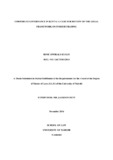| dc.description.abstract | Insider trading which involves the buying or selling of securities while in possession of material
non-public information, is one of the weak corporate governance practices in Kenya.
Kenya’s insider trading laws are inadequate. They are characterized by inadequacies, such as,
limited scope of application, narrow and flawed definitions of insider trading terms, for example,
‘insider’, ‘dealing’ and ‘inside information’. The study also found the disclosure obligations,
insider trading offences and penalties in-exhaustive. On the other hand, the institutional
framework is characterized by inadequacies, such as, poor surveillance and motoring techniques,
weak whistleblowing system, the Capital Markets Authority’s duty to supervise market players is
narrow, lack of adequate support and co-operation from other agencies, poor investor education
and lack of policy guidelines on insider trading regulation.
To draw lessons for Kenya, the study comparatively analyzed the legal frameworks on insider in
the United Kingdom, the United States of America and South Africa. The findings of the study
informed the final recommendations made herein that call for reforms. | en_US |



